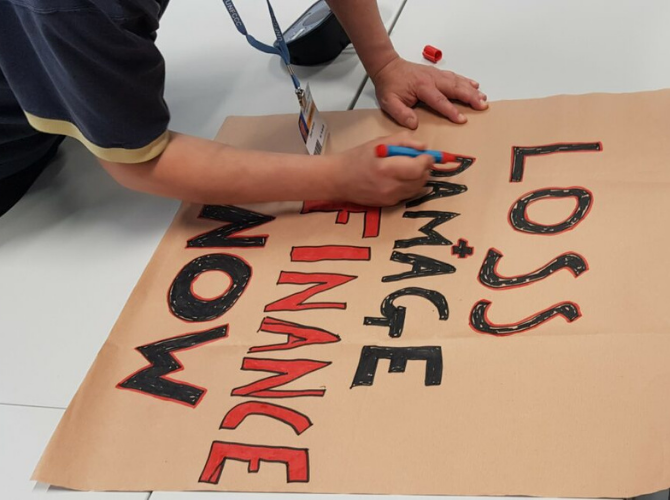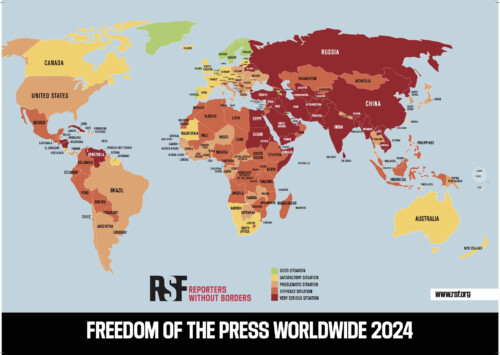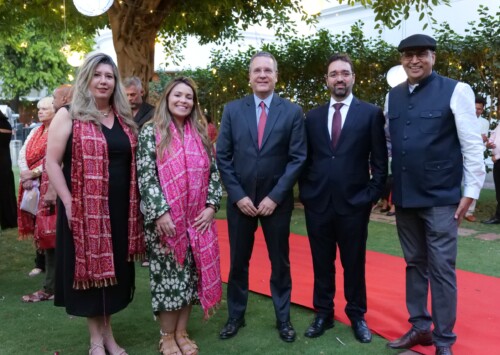Ahead of Cop 28, NGOs demand higher allocation for Loss & Damage Fund

Marginalised communities in the developing countries are most vulnerable to harmful effects of climate change
Days before governments meet in Aswan, Egypt, for the fourth and final Transitional Committee meeting on Loss and Damage ahead of COP28, over 170 organisations from the humanitarian, climate and development sectors have issued a joint call demanding Loss and Damage finance, under the United Nations Framework Convention on Climate Change (UNFCCC), to be based on four priorities: access, adequacy, additionality, and accountability.
The Transitional Committee meeting will begin on October 17 and continue until October 20. In a letter to the governments around the world and the UNFCCC, the organisations say that with the increasingly palpable ramifications of climate change, the interplay between its impacts and humanitarian crises has intensified. The NGOs say that marginalised and vulnerable communities in the developing countries, despite their minimal contribution to climate adversities, find themselves grappling not only with the direct climatic and environmental consequences of climate change but also with a myriad of pre-existing humanitarian and developmental challenges.
The letter goes on to say that while communities, domestic responders, and humanitarians are at the frontlines of this crisis, the overwhelming and escalating needs far surpass their capacities to absorb and recover from shocks. It adds that the existing humanitarian financing system is ill-equipped to adequately respond to multiple and compounding climate impacts.
Access
To address both economic and non-economic loss and damage arising from slow-onset processes and rapid-onset events, there is a need for a substantial increase in finance and in national capacities, through the Loss and Damage Fund, which can be accessed by countries and communities promptly, says the letter.
This is crucial to prevent communities from unjustly suffering the current, immediate, and prolonged ill-effects of human-induced climate change. Consequently, additional resources are essential to address loss and damage, thereby complementing the role played by the humanitarian system.
‘‘We are joining together to support the urgent calls for loss and damage finance under the UNFCCC based on four priorities, namely access, adequacy, additionality, and accountability,’’ say the organisations.
Highlighting the need for clear rules on prompt access to the fund to be set at the earliest, the NGOs say that all developing countries necessitate and are entitled to loss and damage finance based on the principles of equity, justice and human rights. Special attention must be accorded to ensure that particularly marginalised and climate-vulnerable communities and individuals, on the frontline today and in the future, are able to access the loss and damage finance they need, as directly as possible. Access should also be flexible, multi-year, timely, transparent, equitable and administratively light in the context of rapid-onset and slow-onset impacts.
Adequacy
The NGOs also say that financing of the fund must be adequate as climate change is indisputably costly, with the annual costs already amounting to hundreds of billions of dollars in developing countries. As the frequency, scale, and duration of climate-induced extreme weather events and impacts of slow-onset events escalate, more and more people will continue to be affected in ways that surpass their capacity to fully recover from these recurrent calamities.
“Therefore, substantial financial resources are not merely desirable; they are essential. This includes fulfilling commitments for new and additional climate finance and addressing the shortfall in humanitarian finance. It is crucial that loss and damage finance is appropriately scaled to fully cover both the economic and non-economic costs of rehabilitation and reconstruction for affected communities. Additionally, it should equip them with the necessary tools and capabilities to build resilience to future climate-related risks and threats,’’ says the letter.
The NGOs say that the developed countries are obligated under the UNFCCC to provide grant-based financing to address loss and damage in developing countries, as per the principle of equity and Common But Differentiated Responsibilities and Respective Capabilities (CBDR-RC).
Additionality
The NGOs also highlight the need for new money, not existing funds to be rebranded as part of Loss & Damage Fund. “It is imperative that this finance is new and additional to existing commitments for Official Development Assistance (ODA) to fulfil commitments under the UNFCCC and to have a meaningful impact on the lives of those most affected. Double counting, relabelling funds from one priority to another, or providing funding in the form of loans is unacceptable. Such approaches fail to address the true magnitude of the climate crisis and do not meaningfully serve the communities and individuals impacted by climate change. Additionality is a matter of both climate justice and operational necessity to meet the needs and protect the rights of the affected people,’’ say the NGOs.
Accountability
Finally, the letter also calls for accountability, saying it is central to loss and damage finance and is required at multiple levels. The repercussions of loss and damage are traceable to the actions, or inactions, of historical polluters responsible for the climate crisis, who bear the obligation to cover the costs of the harm inflicted.
“The governing body of the Loss and Damage Fund must establish robust systems to ascertain that finance earmarked for addressing loss and damage is distinctly accounted for, based on agreed criteria, and is disclosed publicly to maintain transparency. Both recipient and contributing nations must operate with utmost integrity, adapting their responses to the genuine needs of communities and respecting the human rights of local communities and the Free, Prior, and Informed Consent of Indigenous peoples. This commitment goes beyond mere assistance; it is about empowering impacted communities and individuals by fulfilling their rights to access information and to public participation, thus enabling agency amidst challenges,’’ say the NGOs.
“It is absolutely urgent that the Loss and Damage fund is operationalised at COP28. Time is of the essence. We have small island states that are sinking and could disappear even within a decade. We are at an inflection point in the climate crisis and COPs and other multilateral fora are an opportunity to decide on real solutions. We should have had a Loss and Damage fund and the finance for it many COPs earlier. And now we cannot afford to waste time and have a ghost fund that is unable to serve the countries who desperately need help,” says Senator Sherry Rehman, former Federal Minister for Climate Change of Pakistan and the lead G77 negotiator for Loss and Damage at COP27.
2023 is set to be the hottest year ever with July, August and September among the hottest months since climate records were kept. Many developing and vulnerable countries who are already burdened with unjust debt and loans are struggling to access funds to rebuild and recover from intensifying and frequent climate-induced disasters. Finance for Loss and Damage must be in addition to existing humanitarian aid measures if it is to meet the needs of the moment and the era of the polycrises.
‘‘After months of relentless dialogue on the operationalisation of the Loss and Damage Fund, it is disheartening to find ourselves back at square one. Developed nations appear to be using every tactic in the book to diminish the breadth and depth of the new Fund, aiming to sidestep their responsibilities. As the globe grapples with unparalleled climatic catastrophes, we cannot permit more delays or deceptive maneuver. The communities bearing the brunt of these disasters, through no fault of their own, deserve genuine commitment and action, not betrayal,’’ says Harjeet Singh, Head, Global Political Strategy, Climate Action Network International.










